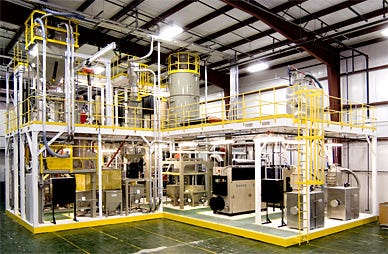January 29, 2014


Among the exhibitors at the National Plastics Exposition taking place at Chicago's McCormick Place this week, Plastic Technologies, Inc. (PTI), announced that it is forming a modular, compact recycling systems service to produce food-grade, recycled polyethylene terephthalate (RPET) resin globally. The system has been designed to cost-effectively address increased international RPET demand for blow molding, injection molding and thermoforming applications, by efficiently turning post-consumer PET containers into reusable food-grade resin.
PTI Recycling Systems, LLC, a wholly-owned subsidiary of PTI, is expected to bring LNO™c RPET production processes to the global marketplace. For the past two years, LNO™c resin has been produced for commercial use in the U.S., by Plastic Technologies’ sister company Phoenix Technologies, Bowling Green, OH.
“Plastic Technologies has a strong reputation as a global engineering firm that executes confidential, technical packaging projects for major brand owners around the world. Because we have had the opportunity to validate the LNO™c process for several applications, we believe that this technology has the potential to become the new global standard for rPET production,” says Craig Barrow, president of PTI.
The new company will be headed by Steve Hawksworth, director, who will be responsible selling and servicing the “small footprint, low energy” system internationally (The equipment requires less than 2,500 sq ft and can easily be taken apart and transported to a new location, if desired). “The base unit produces 10 million pounds or 4,500 metric tons of rPET per year. Capacity can easily be doubled with an add-on module. Further, we estimate the ‘total cost of ownership’ at approximately 40 percent less than other RPET technologies which can require capital investments as high as $8 to 10 million,” Hawksworth reports.
The modular system is suitable for companies that want to quickly and easily incorporate commercially-proven RPET production into their own facilities—particularly those who were previously blocked by capital investment, space and labor constraints. This includes recycling plants, brand owners, retailers, municipalities, etc. That includes a grinder that converts the RPET flake into extra small particle-size powder, a compactor to compress the powder in pellets and a standard resin dryer.
“Our philosophy is that RPET supply is better suited to multiple, smaller, processing operations vs. one or two large capacity plants. We believe in a local‘consume, collect, convert’ approach," Hawsworth explains. "By locating RPET production in closer proximity to resin users, you improve supply times and reduce the carbon footprint.”
The LNO™c process relies on Phoenix’s patented “extremely small particle size” technology. The tiny particle size enables much more efficient decontamination compared to other processes, resulting in faster output and significant energy savings (the “c” in the brandname refers to the resulting “compacted” resin). The RPET is suitable for a variety of food and beverage applications including water, carbonated soft drinks, juices, fruit, baked goods, meats and cheeses. Package types include bottles, thermoformed containers and films, drinking cups and vegetable oil and deli containers.
About the Author(s)
You May Also Like


